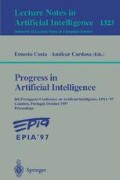Abstract
We present an approach to reasoning about actor programs based on temporal logic. This formal framework allows more sophisticated abstraction mechanisms to be introduced into actor specifications. Such mechanisms turn out to be a major prerequisite for the use of actor systems in large-scale applications.
Preview
Unable to display preview. Download preview PDF.
References
G. Agha, I. A. Mason, S. F. Smith, and C. L. Talcott. A foundation for actor computation. Journal of Functional Programming, 7:1–72,1997.
Gul Agha. Actors: a Model of Concurrent Computation in Distributed Systems. MIT Press, 1986.
Gul Agha. The structure and semantics of actor languages. In J.W. de Bakker et al., editors, Foundations of Object-Oriented Languages, pp. 1–59. Springer, 1990.
Gul Agha et al. Abstraction and modularity mechanisms for concurrent computing. In Gul Agha et al., editors, Research Directions in Concurrent Object-Oriented Programming, pp. 3–21. MIT Press, 1993.
Gul Agha and Carl Hewitt. Concurrent programming using actors. In A.Yonezawa and M.Tokoro, editors, Object-Oriented Concurrent Programming, pp. 37–53. MIT Press, 1987.
Howard Barringer. The use of temporal logic in the compositional specification of concurrent systems. In A. Galton, editor, Temporal Logics and their Applications., pp. 53–90. Academic Press, 1987.
K. Many Chandy and J. Misra. Parallel Program Design. Addison-Wesley, 1989.
WD. Clinger. Foundations of Actor Semantics. PhD thesis, MIT, Dept. of Mathematics, 1981.
E.A. Emerson and J. Y. Halpern. 'sometimes’ and ‘Not Never’ revisited: on branching time versus linear time temporal logic. Journal of the ACM, 33(1):151–178, 1986.
Michael Fisher. A survey of Concurrent METATEM: the language and its applications. In Proc. of the First International Conference on Temporal Logic (ICTL), 1994.
Svend Frølund. Inheritance of synchronization constraints in concurrent object-oriented programming languages. In ECOOP '92 — European Conf on Object-Oriented Programming, pp. 185–196,1992
U. Hahn, S. Schacht, and N. Bröker. Concurrent, object-oriented dependency parsing: the ParseTalk model. Int'l. Journal of Human-Computer Studies, 41(1/2):179–222, 1994.
Fred Kröger. Temporal Logic of Programs. Springer, 1987.
Leslie Lamport. The temporal logic of actions. ACM Transactions on Programming Languages and Systems, 16(3):872–923, 1994.
Henry Lieberman. An object-oriented simulator for the Apiary. In AAAI '83 — Proc. of the National Conf. on Artificial Intelligence, pp. 241–246, 1983
Zohar Manna and Amir Pnueli. The Temporal Logic of Reactive and Concurrent Systems. Springer, 1992.
Peter Neuhaus and Udo Hahn. Restricted parallelism in object-oriented lexical parsing. In COLING '96 — Proc. of the 16th Intl. Conf. on Computational Linguistics, pp. 502–507,1996.
Susan Owicki and Leslie Lamport. Proving liveness properties of concurrent programs. ACM Transactions on Programming Languages and Systems, 4(3):455–495, 1982.
A.S. Rao and M.P. Georgeff. Modeling rational agents within a bdi-architecture. In Proc. of the 2nd Int'l. Conf. on Principles of Knowledge Representation and Reasoning, pp. 473–484, 1991
Yoav Shoham. Agent-oriented programming. Artificial Intelligence, 60(1):51–92, 1993.
M. Yasugi, S. Matsuoka, and A. Yonezawa. ABCL/onEM-4: a new software/hardware architecture for object-oriented concurrent computing on an extended data-flow computer. In Proc. ACM Int'l. Conf. on Supercomputing, pp. 93–103, 1993.
Author information
Authors and Affiliations
Editor information
Rights and permissions
Copyright information
© 1997 Springer-Verlag Berlin Heidelberg
About this paper
Cite this paper
Schacht, S., Hahn, U. (1997). Temporal reasoning about actor programs. In: Coasta, E., Cardoso, A. (eds) Progress in Artificial Intelligence. EPIA 1997. Lecture Notes in Computer Science, vol 1323. Springer, Berlin, Heidelberg. https://doi.org/10.1007/BFb0023929
Download citation
DOI: https://doi.org/10.1007/BFb0023929
Published:
Publisher Name: Springer, Berlin, Heidelberg
Print ISBN: 978-3-540-63586-4
Online ISBN: 978-3-540-69605-6
eBook Packages: Springer Book Archive

